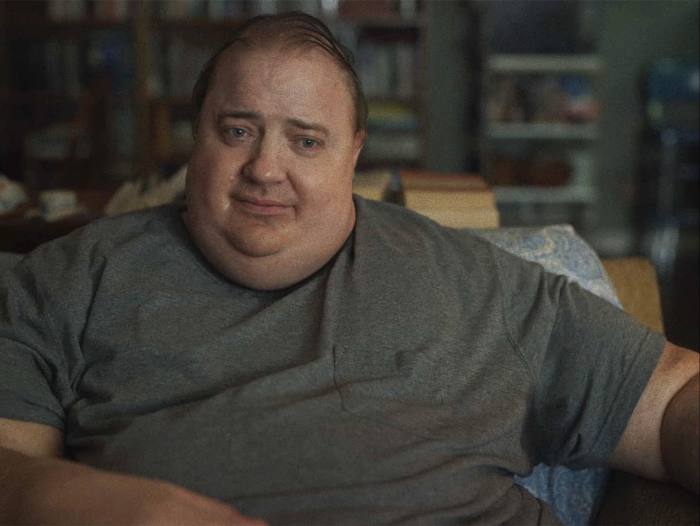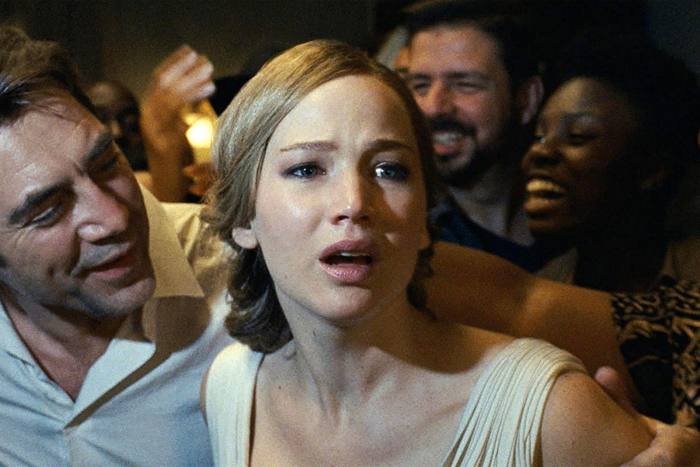Like the morbidly obese protagonist of his new film The Whale, Darren Aronofsky has become accustomed to people recoiling in disgust. With gruelling melodramas such as Requiem for a Dream, The Wrestler and Black Swan the American director has won numerous awards and admirers but has also been vilified for his graphic depictions of human suffering. This reached its apotheosis (one hopes) with 2017’s Mother!, in which he put Jennifer Lawrence through a torturous mangle of home invasion and gross-out allegory.
Audiences scarred by that experience may approach his latest film with trepidation. I was one of them, as I admit to him when we meet in a smart central London hotel suite. It doesn’t help that the opening shot of The Whale shows the enormous and sweat-lacquered Charlie (played by Brendan Fraser) masturbating, wheezing and turning an alarming shade of mauve. My first thought, I tell him, was: “Oh God, is this going to be . . .” He finishes the thought for me: “. . . another Darren Aronofsky?”
There is also the first impression made by that title: both playground jibe and allusion to Moby-Dick, a key reference in Samuel D Hunter’s 2012 play, which Hunter adapted for the screen. Aronofsky, 53, assures me that there were “a lot of discussions. We talked to the Obesity Action Coalition . . . We got to a place where we all felt comfortable with it.”
The director does not want you to jump to conclusions. Or rather he does, so that he can then subvert them. “It’s really important that people watch the movie and not judge something from the cover,” he says. “In fact, that cliché is really apt to Sam’s writing. You, the entire audience and every single character judge [Charlie] from the cover, and then Sam’s beautiful writing slowly dissolves that and makes you think much deeper.”

It’s true that everything is not what it first seems in The Whale, and its surface cruelty eventually gives way to an almost sugary softness. But surely Aronofsky must have been aware that this brutally frank film would prove provocative?
“I wasn’t conscious going in,” he says, his bearing defensive but his tone unapologetic. “I came from it the other way. I noticed my own prejudices when the play started. And, by the end, I felt so deeply for Charlie. That’s what attracted me . . . I didn’t really think about it in the fantastical showman side of creating controversy. I don’t ever really. I just follow the stories I want to tell. It might be that my taste takes me there.”

The same could be said of Aronofsky’s casting of Fraser, which has turned out to be a masterstroke, his performance showered with praise by critics and fans alike. It only adds pathos that Fraser himself has gained considerable weight since playing the six-packed action hero in films such as The Mummy nearly 25 years ago. (That he wore a fat-suit and prosthetics to play Charlie has stoked more controversy.)
Fraser spent years in the showbiz wilderness after alleging sexual misconduct in 2003 against Philip Berk, former president of the Hollywood Foreign Press Association. (Berk has denied the allegation and that the decline in Fraser’s career had anything to do with him.) But since the premiere of The Whale, an internet army of millennials who grew up on the star’s 1990s hits, have risen up to propel him to new Hollywood heights. This week Fraser was nominated for the Best Actor Oscar.
“I can’t take credit for it as if it was calculated,” says Aronofsky. “I actually didn’t realise how much love was out there for him. I’m not that generation. I saw the Mummy movies, but George of the Jungle I missed and Encino Man I never saw. I didn’t realise how seminal they were for so many people. I’m thrilled. People are really excited to welcome him back.”
For Aronofsky this is not entirely new ground. He performed a previous Lazarus-like resurrection by casting a boxing-weathered Mickey Rourke in 2008’s The Wrestler. This case is different, he says. “There was more of a calculation with Mickey because I knew the deep respect he had from the actors of his generation. With Brendan it was really just the right actor at the right moment.”

That moment was an initial meeting in Aronofsky’s office in New York’s Chinatown, which was followed by a live stage reading at a small East Village theatre in front of the director and a handful of others. “I watched him and I was, like: ‘OK, he’s going to be interesting.’”
Two major questions remained: “Physically could he do it? And could he emotionally do it? Because I knew it was going to be a marathon of both technical proportions and emotional proportions.”
By now, anyone auditioning for Aronofsky knows what they are getting themselves into. His exacting methods are legendary — Lawrence tore her diaphragm and dislocated a rib after hyperventilating during the filming of Mother! — and they are not for everyone. Brad Pitt quit the director’s third feature film, The Fountain after two and half years of preparation and has not worked with him since. I ask Aronofsky whether he enjoys pushing actors to their limits, but he resists the suggestion.

“I’ve never forced an actor into a feeling, because it doesn’t work,” he says. “It’s never pushing, it’s sometimes reaching down a hand to pull them up . . . That was the beauty of finding Brendan right when he wanted that. I don’t know if he felt that way in the mid-1990s when he was on his fourth leading-man role.”
Aronofsky, it seems, still believes in the unfashionable notion of suffering for your art. “When actors start, they all want to cry, they all want to show their insides — the ones that aren’t searching for fame and really love the art. That’s why they go to acting school: to cry and to scream and to feel. So I’m just reminding them that, oh, here’s an opportunity to do that.”
He accepts that not all stars have it in them to go through an emotional wringer in film after film, and he cites contrasting examples: “Daniel Day-Lewis is his own self-torturer, and maybe that’s part of the reason he doesn’t work [often], because it’s super-hard work for him. Then there are actors like Ellen Burstyn [star of Requiem for a Dream] who it doesn’t hurt. She loves it; it inspires her. She would leave the set floating on a cloud because she got to leave it all on the screen that day.”

The Whale features not just one outstanding performance but two. Hong Chau has earned a Best Supporting Actress Oscar nomination for her brilliant turn as Charlie’s straight-talking friend and nurse Liz, who administers loving care with a barbed wit.
“She has her own complexities and an inner life about how hard it is to take care of someone like that,” Aronofsky observes. “As anyone who’s been a health caretaker knows, there’s a bittersweetness to it that’s not often portrayed.”
For this film, as for any adapted from the stage, one of the biggest challenges was how to make it sufficiently cinematic. This meant devising inventive ways of blocking scenes (arranging actors’ movements in relation to the camera). “It became about: how do we block this so that it constantly helps the narrative of the story?” says Aronofsky.
He cites a scene in which Charlie’s resentful teenage daughter Ellie pays him a rare visit but paces up and down behind her armchair-bound father while she harangues him. Aronofsky places the camera behind Charlie so that we see him craning pathetically to catch a glimpse of her.
“You empathise with Charlie, because he wants to look at his daughter. And you see how hard it is for him to move. She just keeps going behind him, working his blind spot, and it underlines her messing with Charlie. She’s taunting him.”
Aronofsky has been accused of taunting audiences and having a blind spot himself when it comes to cruelty, but he might argue that, like Charlie, he should not be judged by appearances. After all, he only wants to break your heart.
“Every single person that walks into the theatre and sees Charlie is going to have a pre-judgment about him, especially with how the film starts. But within five minutes, he starts to open up your heart. And by the end, hopefully, he breaks it.”
‘The Whale’ is in UK cinemas from February 3 and in US cinemas now
Find out about our latest stories first — follow @ftweekend on Twitter
Stay connected with us on social media platform for instant update click here to join our Twitter, & Facebook
We are now on Telegram. Click here to join our channel (@TechiUpdate) and stay updated with the latest Technology headlines.
For all the latest Art-Culture News Click Here
